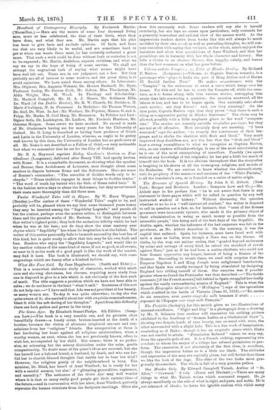probably will be, pleased when we say that some thousand
years hence whether or no ho is a "well-instructed student," the writer is disposed
they may be inserted among the "Ingoldsby Legends," and puzzle all to call in question not a few, as, for instance, that "most of the Roman but the acntest, perhaps oven the acntest critics, to distinguish between governors were inexorable tyrants, who made it the primary object of them and the genuine works of Mr. Barham. Not that they reach to their administration to wring as much money as possible from the that writer's highest point ; they lack the audacious felicity which he had miserable people," this being said of the best days of the Republic. Ho when he was at his best ; nor do they show the utter mastery over doubts, again, whether the influence of the bad emperors was felt in the rhyme which "Ingoldsby " has when its inspiration is at the fullest. The provinces, as Mr. Abbott describes it. On the contrary, it was the writer of this notice personally fails to be much amused by the best fun of capital that suffered. Spain, for instance, must have fared well with this kind, but is quite ready to allow that this may be his own fault and such a man as Galba, even though a Nero was on the throne. Of Loss. Readers who enjoy the "Ingoldsby Legends," and would like to Galba, by the way, our author writes, that "goaded beyond endurance try another volume of the same kind of verse, if not so good, at all events, by crime and outrage of every kind, he raised the standard of revolt as near to it as the work of a good pupil is like the work of the master, against Nero," just as if he had been a native chieftain who could not may find it here. The book is illustrated, we should say, with some bear Roman oppression any longer, instead of being a Roman of the engravings which are funny after a kindred fashion. Romans. Descending to recent times, we read with surprise that the


































 Previous page
Previous page